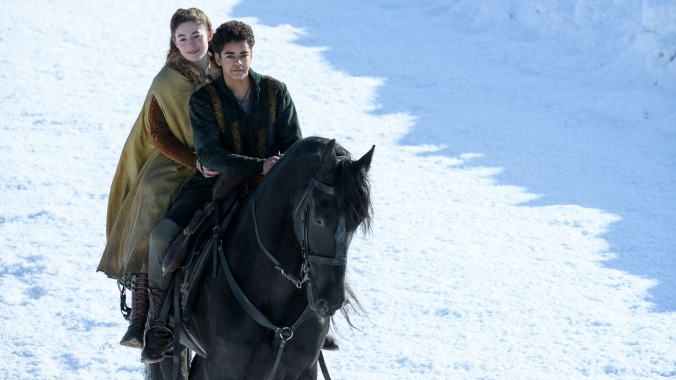Netflix’s The Letter For The King takes too long to fulfill its ambitious quest

Based on a 1962 Dutch novel, The Letter For The King is Netflix’s latest foray into PG action adventure, a kind of How To Train Your Dragon without the dragons. The scrappy young knight-in-training Tiuri (Amir Wilson) receives the titular letter from the dying Black Knight. The older knight tells him the fate of the entire kingdom is at stake, so Tiuri must head out on an arduous quest to deliver it to benevolent King Favian (Yorick van Wageningen). In doing so, Tiuri breaks from his pack of fellow novice knights, who are now tasked to go after him. Naturally, he also encounters a spirited young lady named Lavinia (Ruby Ashbourne Serkis, who shows up here as well) who joins him on his journey and has secrets of her own.
But the question remains: What’s the point of How To Train Your Dragon without the dragons? The quest is pretty straightforward, after all (one letter: deliver it). Nevertheless, it takes Tiuri through a variety of gloomy, dusty settings: seeking shelter at a monastery, cooped up on a crowded ship, wandering through an abandoned town. At least there’s a welcome element of mystery and magic (including a magical horse), leading up to the inevitable final battle of light and dark. King Favian’s nefarious son, Prince Viridian (Gijs Blom), tries to master dark magic to gain peace throughout the realm via absolute tyranny (you know he’s the villain because his hair’s greasy). Still, his efforts lead to some impressive special effects and moments of actual spookiness, as does a very strange resident of “the monastery at the end of the world.” And the picturesque filming locations, in New Zealand and the Czech Republic, are incredible.
But the journey through the series is almost as arduous as the teens trekking through snow-covered mountains. The Letter For The King may have made a fine two-hour cinematic release, but it gets stretched pretty thin across six episodes. There’s a subplot about King Favian’s Crown Prince and his flirtation with young Queen Alianor (Emilie Cocquerel) that gets a lot of screen time mid-series but never reaches fruition. The monastery departure nearly snuffs out the momentum completely in episode three, as the action and dialogue actually appear to be proceeding in slow motion. Things need to pick up considerably in episode four, but don’t—the show gets bogged down by a ghost story and the aforementioned overbooked former pirate ship. And both episodes are filmed in such darkness that at times it’s difficult to tell what’s going on. And Tiuri doesn’t reconnect with his fellow novices until much too late in the series.
Like many fantasy creations before it, The Letter For The King focuses on adolescence as the time when your true self emerges, when you find out what you’re really made of, hopefully discovering a bit of your own magic along the way. Tiuri, an inexperienced knight-in-training, has no other reason than his own honor to take up this journey that will likely kill him, especially as many evil bands are trailing him to prevent the letter from being delivered. “The world’s a horrible place,” he explains to Lavinia. “It takes people like us to do something about it.”
If only Tiuri’s adventurous quest had a bit more adventure in it. His fellow novices are appealing, if stereotypical—the warrior, the musician, the earnest one, the obnoxious one—likable, but could use more to do. Wilson and Asbourne Serkis have a sweet chemistry, and it’s hinted that some of the others do as well, if only that were fleshed out. Kids used to movies about Marvel heroes and wizarding schools and colorful dragons may find the journey a bit of a slog (and likely aren’t as familiar with the source material). Things perk up again toward the end with some fun sword swashbuckling and the buildup to that inevitable final confrontation. But with so many other streaming options available, who knows whether kids watching will still be on board at that point?
The Letter For The King winds up with a few loose ends, ostensibly opening the door for a season two. If it does get a second season, hopefully the series will expand on its positive aspects—young appealing leads, gorgeous scenery, valuable life lessons—while paring down on the pointless plots and tired meandering. A series with a title this simple shouldn’t be so convoluted.